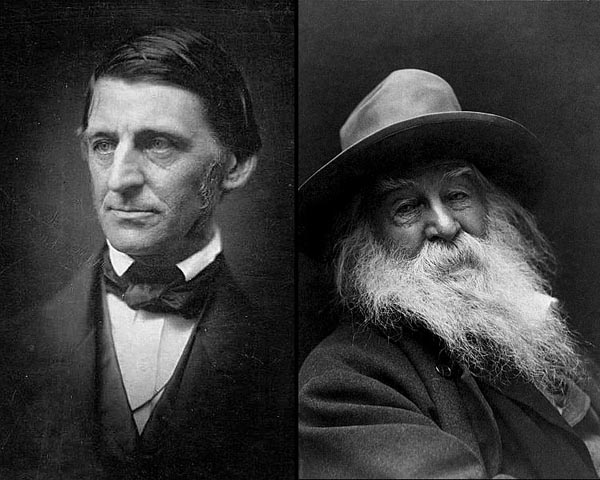 |
| Emerson (left) and Whitman (right) (Wikipedia: Emerson, Whitman) |
Note: These two 19th-century authors (among others) helped establish the American philosophy of individualism. Let's meet them!
Get Ready: Do you feel it's more important to live as an individual, or as a member of a larger group?
Late May marks the births of two great American thinkers: Ralph Waldo Emerson was born May 25, 1803, and Walt Whitman was born May 31, 1819.
--------
Ralph Waldo Emerson was a prolific writer, and the founder of the New England Transcendentalists. He was friends with the well-known writers Nathaniel Hawthorne and Henry David Thoreau. In fact, Thoreau's most famous book, Walden, was written while Thoreau stayed on Emerson's land. (See Lesson #08-111 for more about Thoreau's book.)
One of Emerson's greatest essays was titled "Self-Reliance." In it, he says that each person needs to follow his own ideas. We shouldn't just do what everyone else is doing, he says, but find our own dream.
Here are a few quotations:
- [Our age] is said to be the age of the first person singular.
[The first person singular is "I," and so Emerson announces that the 19th century is the age of the individual.]
- What I must do is all that concerns me, not what the people think.
- Insist on yourself; never imitate.
[Emerson insists that we do what our heart tells us, and not listen to "the voice of the crowd."]
- Nothing can bring you peace but yourself. Nothing can bring you peace but the triumph of principles.
[This path of self-reliance, he says, is the only way to achieve inner peace.]
--------
Emerson was an essayist and public speaker. It was another man, Walt Whitman, who phrased many of Emerson's ideas into poetry.
Emerson had written an essay in 1845 called "The Poet," in which he called for an American poet to express the young nation's voice. Whitman wrote Leaves of Grass (1855) as an answer to that call. (Emerson himself called the book, "the most extraordinary piece of wit and wisdom America has yet contributed.")
Leaves of Grass is an anthology, a collection of many poems with a few themes running through it, including the impact of urbanization on America (which had been mainly rural before that time). Later editions include poems about the death of Lincoln and its impact on American history.
But the overall theme of Leaves of Grass, as that of Emerson's "Self-Reliance," is the idea of individualism. In fact, the opening poem is now called "Song of Myself." It 'goes like this:
One's-Self I sing, a simple, separate person;
Yet utter the word Democratic, the word en-Masse.Of physiology from top to toe, I sing;
Not physiognomy alone, nor brain alone, is worthy for the Muse
I say the Form complete is worthier far;
The Female equally with the Male I sing.Of Life immense in passion, pulse, and power,
Cheerful for freest action form'd, under the laws divine,
The Modern Man I sing.
["physiology" is the function of the body; "physiognomy" is the appearance of the face.]
Whitman was not ashamed to declare the glory of the individual. However, the book was at first poorly received, and even brought charges of obscenity.
You can easily find Emerson's Essays and Whitman's Leaves of Grass at online. See what you think of these very American works.
--------Read more:
- Emerson: https://en.wikipedia.org/wiki/Ralph_Waldo_Emerson
- Whitman: https://en.wikipedia.org/wiki/Walt_Whitman
Practice: Match the term to its definition below:
- anthology
- ashamed
- essayist
- imitate
- individualism
- obscenity
- prolific
- theme
- Transcendentalists
- urbanization
- copy; do the same thing as others
- a collection of writings
- embarrassed; shy
- the philosophy that one person is more important than the group
- the guiding idea of a work of literature
- being offensive to moral decency
- one who writes articles exploring an idea
- productive; doing a lot of something
- changing from having more countryside to having more cities
- believers in things outside of this world where we can see and touch etc.
Answers are in the first comment below.
Submitted to the Shenzhen Daily for May 29, 2008


Answers to the Practice: 1. b; 2. c; 3. g; 4. a; 5. d; 6. f; 7. h; 8. e; 9. j; 10. i
ReplyDelete